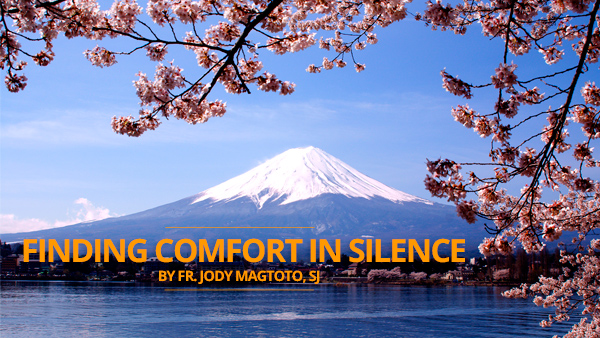


Fr. Edward Joseph T. Magtoto, SJ
August 4, 2015
“Be slow to speak, and only after having first listened quietly, so that you may understand the meaning, leanings, and wishes of those who do speak. Thus you will better know when to speak and when to be silent.” –St. Ignatius of Loyola
For the first two years of my mission here in Japan, I have been tasked to learn the Japanese language. It is quite a struggle since the language is so different from English and Filipino. Japanese has many complex sentence patterns that have no equivalent in any of the languages I know, and learning an ideograph-based writing system at my current advanced age makes it even more difficult. The barrage of language information in class—grammar, vocabulary, and writing leave little opportunity to speak. Hence, I find myself understanding more than I can speak.
Most of the time, I keep silent. As an introverted person, I find comfort in silence. Yet I realize that the silence in Japan need not mean a lack of communication. In fact, silence plays an important role in the culture. Pauses in the language could mean a polite hesitation to decline a suggestion, or when accompanied with a gesture of bringing your hand close to your own face, it may mean a simple way of thanking someone for being treated kindly. Silence in the trains lessens the discomfort of travel—it allows the elderly to take a light nap, or the salarymen to be immersed in a different world through reading. Silence in the culture gives space too for one to reflect and give space for God.
This brings me back to the origins of my vocation to the Japanese missions. It was 2010, through the encouragement of my rector Fr. Matsumoto Koichi that I first seriously discerned about offering myself to the Japanese missions. Yet in 2011, because the Great Tohoku earthquake and tsunami, what was supposed to be a mere exposure to the various ministries of the Society of Jesus in Japan became an opportunity to volunteer for the people of Kamaishi who were badly affected by the tsunami. In the moments of helplessness, rummaging through the chaos of the debris, I strangely enough found peace. Amidst the pain and suffering that surrounded me, there was silence and I found God. I felt a calling similar to that when I began thinking of becoming a Jesuit.
Now that I am struggling with grammatical forms, I continue to remember those moments of consolation when I volunteered. It has given me the determination to continue despite the difficulties brought about by the present circumstances. I may now often be silent, but I know this is not a silence of insecurity or aloofness. I know this silence is part of my mission. This stage of silence will allow me to listen more, to pay close attention to what is not said. This stage will allow me to accept rather than judge, to understand rather than quickly admonish, to be, rather than do.
“…a great and strong wind rent the mountains, and broke in pieces the rocks before the LORD, but the LORD was not in the wind; and after the wind an earthquake, but the LORD was not in the earthquake; and after the earthquake a fire, but the LORD was not in the fire; and after the fire a still small voice. And when Elijah heard it, he wrapped his face in his mantle and went out and stood at the entrance of the cave.” Kings 19, 11-13
Fr. Edward Joseph T. Magtoto, SJ or Fr. Jody is missioned to Japan. He is currently learning the Japanese language and lives in the Jesuit Scholasticate in Tokyo.